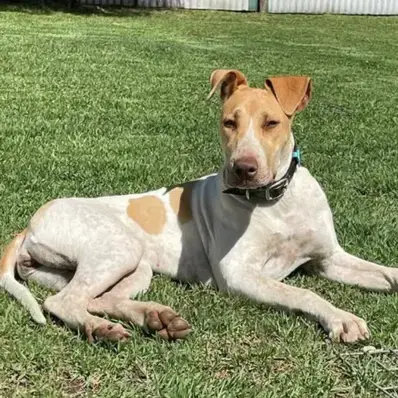Bull Arab History/Origin
The Bull Arab originated in 1972, bred by Mike Hodgens in Australia to combine the strength of the English Bull Terrier, the speed and sighting skills of the Greyhound, and the scenting and intelligence of a Pointer.
The breed is believed to be half Bull Terrier and a quarter Greyhound, with some debate over whether the remaining quarter is German Shorthaired Pointer or English Pointer. There are also claims that Bloodhounds, Mastiffs, and Great Danes were later added.
The breed quickly became Australia’s top pig-hunting dog. In 1981, Hodgens ceased breeding Bull Arabs and stopped breeding dogs entirely by 1989. Known for their aggressive and tenacious nature, Bull Arabs have been utilized in police work, security, and search and rescue missions. Despite their capabilities, they are not recognized by the American Kennel Club.
Bull Arab Personality
The Bull Arab is one of the dog breeds known for its intensely loyal and protective nature, making it an excellent family companion when properly trained and socialized. Despite their muscular build and strong presence, Bull Arabs are surprisingly calm and gentle with those they trust.
They are affectionate, forming deep bonds with their families, and are often described as having a balanced temperament.
- Potential Challenges
While Bull Arabs come with some challenges, such as a strong prey drive, high energy levels, and the need for consistent training and socialization, these can be effectively managed with proper care. Regular exercise, secure environments, and early training can address their high energy and prey drive.
Ensuring regular vet check-ups and preventive care can help manage health issues. Despite these challenges, Bull Arabs are incredibly loyal, affectionate, and intelligent, making them excellent family companions for those willing to meet their needs. With the right approach, the Bull Arab’s strengths and endearing qualities can shine through, offering a rewarding and fulfilling relationship.
Bull Arab Physical Appearance
The Bull Arab is a sturdy hybrid dog with a broad, proportionate head and drooping ears. Bred to pin and hold wild pigs, they possess powerful jaws suited for the task. Eye color varies with coat color—darker coats usually have brown eyes, while lighter coats often have amber eyes.
- Size
Bull Arabs weigh between 60 to 95 pounds and stand 24 to 27 inches tall at the shoulder. However, it’s not uncommon for some to fall outside this average range, either smaller or larger.
- Coat color
The Bull Arab has a short, harsh coat that may also include a softer, thicker undercoat during the winter months. Most Bull Arabs are predominantly white with colored patches in shades of brown, tan, or black, often with ticking in the white areas.
While cream and white with patches are common, they can also come in other popular colors like black, liver, brindle, red, silver, or blue. The exact coat characteristics and colors can vary depending on their specific lineage.
Brindle Bull Arab- Source: bullarabrescue
White Bull Arab- Source: bullarabrescue
Black and White Bull Arab- Source: bullarabrescue
Brown and White Bull Arab- Source: bullarab
Bull Arab Gender Differences
There is a slight size difference between male and female Bull Arabs. Males generally tend to be slightly larger and heavier than females, with more pronounced muscularity. Females, while still robust, are typically a bit smaller and lighter.
Bull Arab Feed/Nutrition
The Bull Arab requires a diet tailored for large, high-energy breeds, with an ideal daily intake of around 2.5 cups of food. To prevent weight gain, avoid free-feeding and adhere to a consistent feeding schedule, while also limiting treats.
Their dietary needs will evolve from puppyhood through adulthood and into their senior years. So consult your veterinarian for personalized recommendations based on your Bull Arab’s specific weight, energy level, and health conditions. Strawberries can be a healthy treat for your dog when given in moderation, offering antioxidants and vitamins.
Bull Arab Health
The Bull Arab breed shares some health predispositions with the Greyhound, German Shorthaired Pointer, and English Bull Terrier. Although they are generally healthy, they can be prone to specific health issues, making regular veterinary checkups and good care essential.
Common health problems in Bull Arabs include:
- Canine Gastric Torsion: This condition involves the stomach filling with gas and twisting, which can be life-threatening and requires immediate medical attention. Preventive measures include feeding smaller, more frequent meals and avoiding vigorous exercise right after eating.
- Cataracts: Bull Arabs may develop cataracts, leading to cloudiness in the eye and potentially affecting their vision. Regular eye check-ups can help detect cataracts early, and a balanced diet rich in antioxidants may support eye health.
- Epilepsy: This neurological disorder causes seizures and can impact the dog’s quality of life if not managed properly. Preventive measures include maintaining a consistent routine, managing stress, and adhering to prescribed medications if diagnosed.
- Primary Lens Luxation: This condition occurs when the lens of the eye dislocates, which can lead to blindness if not treated promptly. Regular veterinary eye exams can help catch the condition early, and any symptoms should be addressed immediately to prevent progression.
- Hip Dysplasia: This condition involves improper fitting of the hip joint, leading to pain and arthritis. Preventive measures include maintaining a healthy weight, avoiding excessive joint strain, and regular vet check-ups.
Bull Arab Care and Grooming
Bull Arabs can be prone to weight gain, particularly if they lack sufficient exercise, despite their high energy levels. Ensure your dog receives at least two brisk walks of 30 minutes to an hour each day, along with active play sessions and shorter walks throughout the day.
Daily ear checks for debris and pests are essential, and clean them according to your vet’s recommendations. Trim your dog’s nails regularly, typically once or twice a month, to prevent them from clicking on the floor. Your groomer can assist with this.
Brush their coat a few times a week to remove loose hair and debris, and to maintain its smoothness. Pay attention to any changes in their coat or skin, as these can indicate health issues.
Regular grooming helps keep their coat healthy and can also strengthen the bond between you and your dog. House training your dog early establishes good habits and ensures a well-behaved companion.
Bull Arab Rescue Groups
Rescue groups for Bull Arabs are dedicated to finding loving homes for dogs in need, often focusing on those who are abandoned or in shelters. These organizations provide medical care, rehabilitation, and rehoming services to ensure that Bull Arabs get a second chance at a happy life. Supporting and adopting rescue groups can help alleviate the burden on shelters and give these loyal dogs the opportunity they deserve.
Bull Arab Price
The price of a Bull Arab typically ranges from $1,000 to $3,000, depending on factors such as breeder reputation, pedigree, and location.
When buying a Bull Arab, choose reputable breeders who follow ethical practices, including health screenings and proper socialization. These breeders focus on the well-being of their dogs and improve the breed responsibly. Alternatively, consider adopting from rescue groups to provide a loving home to a dog in need.
Interesting Facts
- Bull Arabs are relatively rare outside of Australia, with limited recognition and presence in other countries.
- The breed’s development started in the 1970s, making it a relatively new breed compared to many other dog breeds.
Best For
The Bull Arab is best suited for experienced dog owners who can provide consistent training and ample exercise. Their high energy and strong prey drive make them ideal for active individuals or families with large yards who can meet their needs. They thrive with owners who are committed to their physical and mental stimulation.
Top Names
| Male Bull Arab Names | Female Bull Arab Names |
| Max | Bella |
| Duke | Luna |
| Rex | Zara |
| Thor | Ruby |
| Diesel | Athena |











 Brindle Bull Arab- Source:
Brindle Bull Arab- Source:  White Bull Arab- Source:
White Bull Arab- Source:  Black and White Bull Arab- Source:
Black and White Bull Arab- Source:  Brown and White Bull Arab- Source:
Brown and White Bull Arab- Source: 







